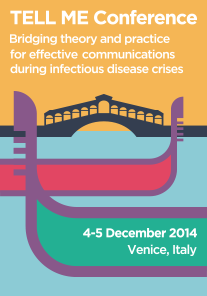Minor infectious outbreaks are good tests for communication in case of pandemics
The recent polio outbreak in Israel – and the vaccination campaign that followed – represented a testing ground for public institutions, which reexamined their public communication strategies after all the mistakes made during the A-H1N1 pandemic in 2009.
Concurrently with such an event, from 2nd to 4th October, Israel also hosted a meeting within the TELL ME Project (Transparent communication in Epidemics: Learning Lessons from experience, delivering effective Messages, providing Evidence), an international project co-funded by the 7th Framework Programme of the European Community. Aim of the meeting was the validation of a communication model – developed by the workgroup led by Manfred Green, from the School of Public Health of the University of Haifa – that should be followed in case of an infective disease outbreak.
“Although it is clear by now that communication plays a relevant role when facing an epidemic, and particularly a pandemic,” said Anat Gesser-Edelsburg, from the School of Public Health of the University of Haifa, “we are still suffering a lack of models in this field. A top-down approach to the transmission of information, from institutions to the public, without any chance to get a real feedback or to exchange roles, seems now to be outdated. For this reason, we developed a new model, different even from a graphical point of view, in order to highlight the reciprocal interactions in the dialogue between all the involved stakeholders.”
When asked about the current events, experts gathered in Haifa positively evaluated the response from Israeli institutions to the discovery of the circulating poliovirus. “Between 2009 and 2010, Israeli government bought 7 million doses of vaccine to protect all the population from the flu pandemic, but the vaccination rate was only of 10%,” reminded Itzhac Zaidise, founder and Head of the Health Administration Graduate Program at the School of Public Health of Haifa University, in Israel. “Having learnt from that experience, risk communication during this new emergency was definitely more effective.”
All the rules about transparency, coherence and flexibility of communication that TELL ME experts identified as essential were respected, whilst institution tried to involve all the relevant stakeholders, especially healthcare professionals and several categories of opinion leaders.
This strategy allowed to obtain a high vaccination rate: according to the data published online by the Minister of Health, by the end of September, 840,000 children have been already vaccinated, when the expected target was one million.


